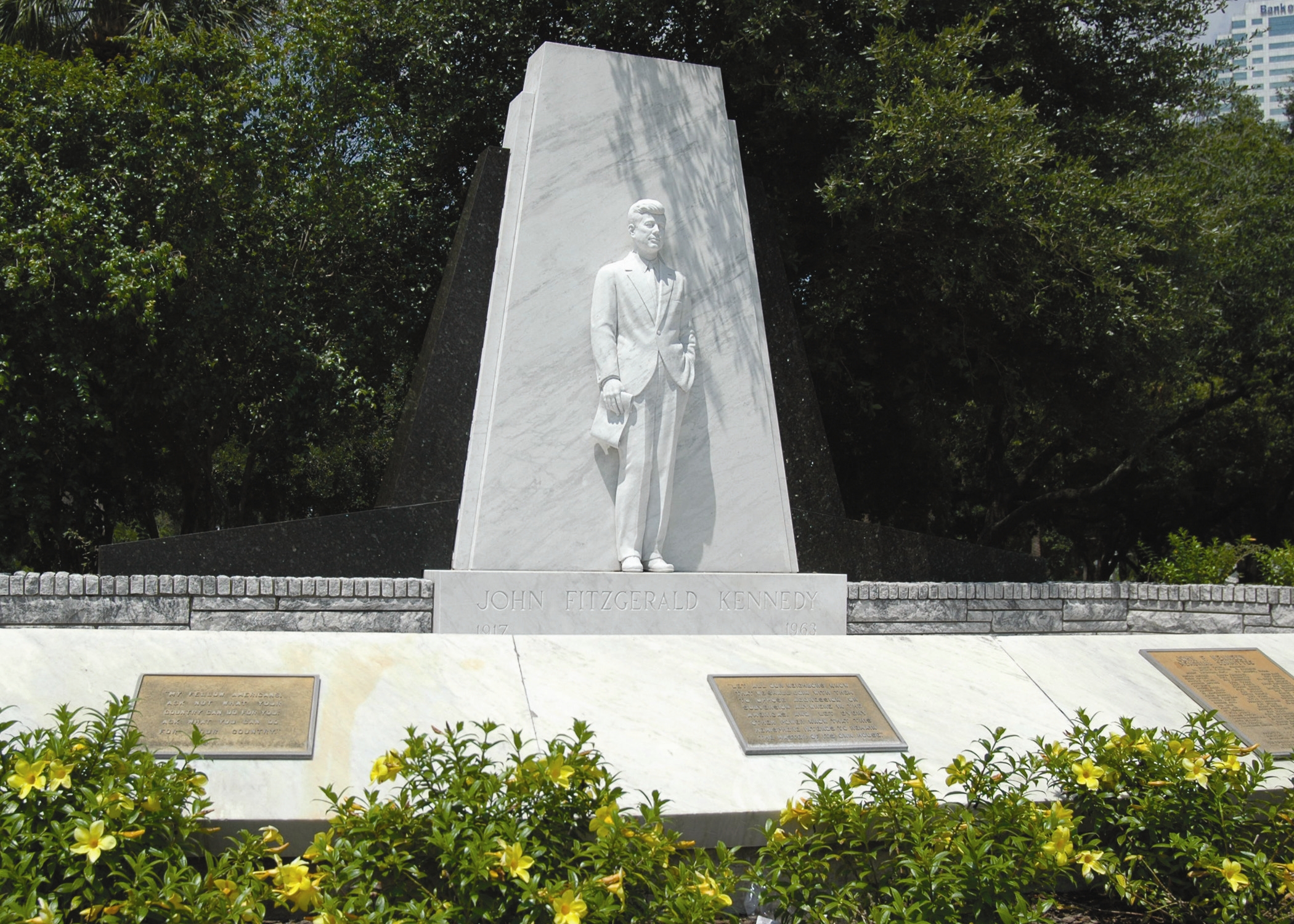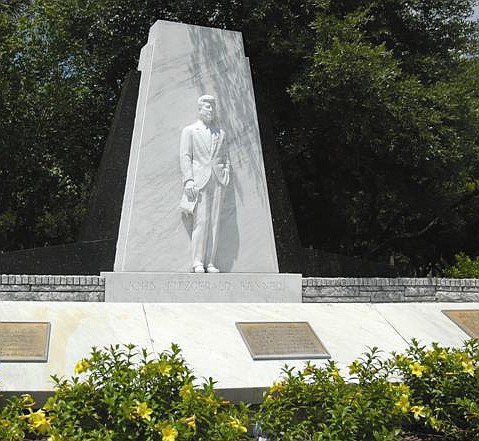 A statue of John F. Kennedy is located in Plant Park on the University of Tampa campus in Tampa, Fla. Tampa also has a street named Kennedy Boulevard memorializing the president's visit to Tampa four days before he was assassinated in 1963, and many Republicans will travel along the thoroughfare named for the Democrat as they go between their hotels and the site of the Republican National Convention, which begins Aug. 27.
A statue of John F. Kennedy is located in Plant Park on the University of Tampa campus in Tampa, Fla. Tampa also has a street named Kennedy Boulevard memorializing the president's visit to Tampa four days before he was assassinated in 1963, and many Republicans will travel along the thoroughfare named for the Democrat as they go between their hotels and the site of the Republican National Convention, which begins Aug. 27.By TAMARA LUSH
Associated Press
TAMPA, Fla. - The Republican National Convention and the peak of hurricane season collide in Tampa this month. And though planners are banking on years of data that a major storm won't hit, they also have laid out worse-case scenarios that include canceling if it's clear the 70,000 expected delegates, officials, journalists and protesters would be in harm's way.
Tampa is one of the places in the region most vulnerable to storm surge. In a major hurricane, floodwaters could reach some 3 miles inland - Tampa is on a bay, not directly on the Gulf of Mexico - and storm surge could reach as much as 17 feet. The Tampa Bay Times Forum, the convention's home, is in an area that would be required to evacuate if winds exceeded 96 mph.
But that doesn't seem likely, say experts, whose studies determined storms usually don't hit Florida's Gulf coast at the end of August.
More of a worry is that people will suffer problems during the hot and steamy Tampa summer.
"It is brutally hot down here," said Steve Huard, spokesman for Hillsborough County Health Department. "We're trying to do everything we can to keep people from passing out."
In May, Florida officials held a four-day mock hurricane drill. Officials laid out a worst-case scenario for the emergency planners: what if (fake) Hurricane Gispert - a (fake) Category 3 storm - struck Tampa on the second day of the RNC?
Under that scenario, state leaders canceled the convention. RNC organizers have been asked repeatedly to talk about what will happen if a hurricane threatens the convention. While they acknowledge the possibility, like many security issues, they are close-mouthed about any evacuation plans.
Political conventions have been held before in cities where hurricanes and the heat are summertime threats, though none has been in Florida for 40 years. The RNC was in Houston in 1992, New Orleans in 1988 and in Miami Beach in 1968 and 1972 - all cities that have been hit by storms, and during a time when hurricane forecasts weren't as accurate as they are today.
Forecasters say that fortunately, most Gulf storms emerge earlier or later in the hurricane season, which runs from June 1 to Nov. 30.
In late August, "the majority of the activity shifts to the Atlantic. But it's not impossible, of course," said Anthony Reynes, a forecaster at the National Weather Service in Ruskin, Fla.
The last major storm to hit Florida's west coast was Hurricane Charley, a Category 4 packing 150 mph winds. The Aug. 13, 2004, storm was small yet powerful - and was initially forecast to strike the Tampa Bay area before it turned and slammed Port Charlotte, about 100 miles south.
Tampa Mayor Bob Buckhorn points out that a major hurricane hasn't hit the area in more than 90 years and that even if one were to threaten the region, everyone would have several days' notice. Not only would convention-goers be in danger, so would some of Tampa's 4 million residents.
"Hurricanes don't occur overnight," he said.
Heat is another story, however. Officials worry that the tens of thousands convention visitors won't understand that danger and some could wind up in the hospital or worse.
The convention in downtown Tampa from Aug. 27-30 will be squarely during the swampy summertime when tourists usually avoid the Sunshine State.
Forecasters say the weather will almost certainly follow a late summer pattern of hot, humid mornings followed by rainy afternoons. Generally, breezes develop over the Gulf and then move inland; the leading edge of the sea breeze boundary is where most of the thunderstorm activity develops.
The average temperature is in the mid-90s, said Reynes, while the humidity can reach 75 to 80 percent. Heavy rains usually emerge between 1 and 6 p.m. nearly every day - and unlike thunderstorms elsewhere, they don't usually leave cooler weather behind.
"That makes for a very uncomfortable, muggy day," he added. "You can have a heat index possibly to 100."
Floridians know how hot that can feel and respect it by staying inside if possible. But out-of-state visitors may be clueless.
"The folks that are coming here may not realize just how hot it can be," Buckhorn said.
The Health Department plans to include flyers warning about the heat in each delegate's welcome package. Other brochures and cards will be handed out to others on the streets, urging people to drink lots of water, wear sunscreen with a high SPF and to seek shade if possible.
Officials are a bit more worried about the journalists and protesters who will be outdoors; most of the delegates will be inside the event hall or shuttled to and from parties, meetings and hotels in air-conditioned vans.
Huard said the city will offer at least two "cooling stations" for people outside of the air-conditioned convention sites. The stations will have misters, fans, water and shade. Area hospitals have agreed to take patients so as not to overwhelm any one facility.
Added Tampa Police Chief Jane Castor: "I believe that after all is said and done that the heat will probably be the biggest issue that we deal with."
